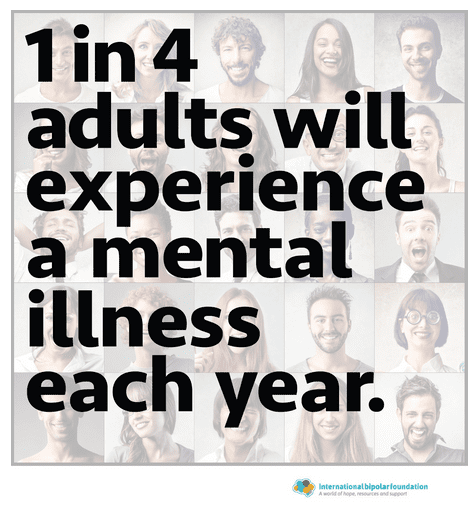Thats not a real illness. I dont believe in mental health. If you dont need medication, you must not really have bipolar.
These are just a few of the long stream of comments from people in my life, the most recent being You know, I dont think youre bipolar, I think you have cyclomania, because having a Bachelors in psychology obviously means that you know more than the multiple psychologists and psychiatrists that have confirmed my diagnosis.
I think one of the hardest things people living with a mental health disorder face is the stigma – but worse than stigma is denial. Denial that your condition exists, denial of your symptoms, denial from those close to you that you are in fact one of those people.
Except those people dont exist. Theyre everybody. Recently, I spoke at a university about writing for mental health. I pointed out to the class that probably a third of them were living with a mental health disorder, and the rest had someone in their personal life who was.
Almost every head nodded in agreement.
In an age where more and more actors, singers, and famous people are speaking out about mental health and the stigma, an age where our resources are growing with the digital age – there are magazines, helplines, even phone apps to detect your mood – there are still people who deny the existence of these disorders. There are still people who will look at you, and tell you that you must not have a certain illness because you dont embody a certain trait or stereotype.
Ive sent a good many people packing because of it. For personal reasons, and with permission from several doctors, I do not take medication for my disorder, except when necessary – the last time being more than seven years ago. Because of that, many people find it hard to believe when I say Im bipolar. The first question they ask is what kind of medication I take, and when they discover I do not, there is usually a moment of fear and then well you dont act crazy.
Sometimes this results in the end of our relationship – or just a distance between us that I dont often want to cross. At others times, it becomes a valuable opportunity for me to connect with someone and show them that not every person with bipolar disorder is the same. Not everyone with a mental health disorder is the same.
Yes I have bipolar disorder. And no, I dont use medication to control it. But I do know countless people who are better for antidepressants or mood-stabilizers, and when the times come where that is needed, I dont shy away. Because I know my diagnosis, as much as I know myself.
Knowing myself, my limitations, my skills, and all the quirks that make me me – that knowledge is what keeps me healthy. I know when my limit is reached. I know when I need medical intervention. And I know, that no matter what others opinions are, my diagnosis is just as much a part of me and 100% completely real.


